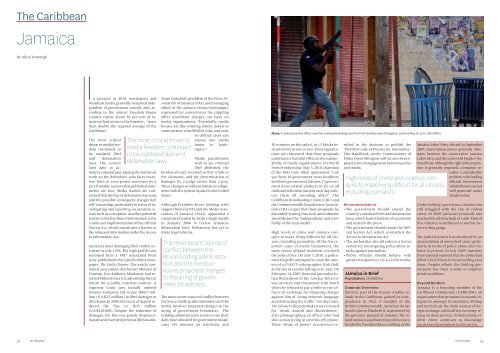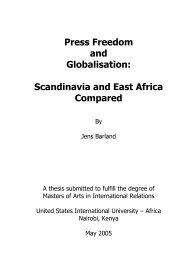FOCUS ON THE AMERICAS - International Press Institute
FOCUS ON THE AMERICAS - International Press Institute
FOCUS ON THE AMERICAS - International Press Institute
Create successful ePaper yourself
Turn your PDF publications into a flip-book with our unique Google optimized e-Paper software.
The Caribbean<br />
Jamaica<br />
By Alicia Versteegh<br />
In Jamaica, in 2010, newspapers and<br />
broadcast media generally remained independent<br />
of government control, and, according<br />
to the annual Freedom House<br />
country report, about 50 per cent of Jamaicans<br />
had access to the Internet – “more<br />
than double the regional average of the<br />
Caribbean.”<br />
The most critical<br />
threat to media freedom<br />
continued to<br />
be outdated libel<br />
and defamation<br />
laws. The current<br />
laws date to Jamaica’s<br />
colonial past, placing the burden of<br />
truth on the defendant, who faces excessive<br />
fines or even prison sentences by a<br />
jury if unable to prove that published statements<br />
are true. Media leaders are concerned<br />
that the fear of defamation lawsuits<br />
and the possible consequent charges fuel<br />
self-censorship, particularly in terms of investigating<br />
and reporting on sensitive issues<br />
such as corruption. Another potential<br />
barrier to the free flow of information is the<br />
continued implementation of the Official<br />
Secrets Act, which constitutes a barrier to<br />
the release of information under the Access<br />
to Information Act.<br />
Jamaica’s most damaging libel verdict occurred<br />
in July 1996. The high profile case<br />
stemmed from a 1987 Associated <strong>Press</strong><br />
story published in the island’s oldest newspaper,<br />
The Daily Gleaner. The article contained<br />
accusations that former Minister of<br />
Tourism, Eric Anthony Abrahams, had received<br />
bribes from a U.S. advertising firm in<br />
return for a public relations contract. A<br />
Supreme Court jury initially ordered<br />
Gleaner Company Ltd. to pay J$80.7 million<br />
(U.S.$2.5 million) in libel damages to<br />
Abrahams. In 2000, the Court of Appeal reduced<br />
the fine to J$35 million<br />
(U.S.$410,000). Despite the reduction of<br />
damages, the fine was grossly disproportionate<br />
and exceeded previous libel awards.<br />
The most critical threat to<br />
media freedom continued<br />
to be outdated libel and<br />
defamation laws.<br />
Jenni Campbell, president of the <strong>Press</strong> Association<br />
of Jamaica (PAJ), and managing<br />
editor of The Jamaica Gleaner newspaper,<br />
expressed her concern over the crippling<br />
effect exorbitant charges can have on<br />
media organizations: "Essentially, media<br />
houses are like winning lottery tickets to<br />
some persons who file libel suits, and costs<br />
to defend cases can<br />
expose any media<br />
house to bankruptcy."<br />
Media practitioners<br />
wish to see criminal<br />
libel abolished, the<br />
burden of truth reversed so that it falls to<br />
the claimants, and the determination of<br />
damages by a judge rather than a jury.<br />
These changes would put Jamaica in alignment<br />
with the system in place in the United<br />
States.<br />
Although President Bruce Golding, with<br />
support from the PAJ and the Media Association<br />
of Jamaica (MAJ), appointed a<br />
committee headed by Justice Hugh Smalls<br />
in January 2008 to review Jamaica’s<br />
defamation laws, Parliament has yet to<br />
make legal reforms.<br />
The most recent source of<br />
conflict between the<br />
Bruce Golding administration<br />
and the media involves<br />
proposed changes<br />
to the airing of government<br />
broadcasts.<br />
The most recent source of conflict between<br />
the Bruce Golding administration and the<br />
media involves proposed changes to the<br />
airing of government broadcasts. The<br />
Golding administration wants to use their<br />
daily time allocated for government broadcasts<br />
(45 minutes on television, and<br />
Above: A Jamaican police officer searches overhead buildings near the Tivoli Gardens area of Kingston, Jamaica May 26, 2010. (REUTERS)<br />
30 minutes on the radio), in 13 blocks instead<br />
of only in one or two. <strong>Press</strong> organizations<br />
are concerned that these proposals<br />
could have a harmful effect on the sustainability<br />
of media organizations. On World<br />
<strong>Press</strong> Freedom Day, May 3, 2010, chairman<br />
of the MAJ Gary Allen questioned, “Can<br />
you hear 10 government news headlines<br />
and three government features, 13 government<br />
news-related products in all, on all<br />
radio and television stations each day without<br />
them all sounding alike?” The<br />
Caribbean Broadcasting Union (CBU) and<br />
the Commonwealth Broadcasters Association<br />
(CBA) urged that these proposals be<br />
discarded, fearing that such amendments<br />
would distort the “independence and credibility<br />
of the local media”.<br />
High levels of crime and violence conspire<br />
to make living difficult for all citizens,<br />
including journalists. Of the few reported<br />
cases of media harassment, the<br />
most recent alleged incidents involved<br />
the police force. On July 3, 2010, a policeman<br />
allegedly attempted to seize the camera<br />
of a CVM TV videographer, Kirk Hall,<br />
at the site of a police killing in St. Ann. On<br />
February 14, 2009, financial journalist Julian<br />
Richardson of the Jamaica Observer<br />
was arrested and threatened with death<br />
when he refused to pay a bribe to two officers<br />
in exchange for dropping charges<br />
against him of “using indecent language<br />
and obstructing the traffic.” Six days later,<br />
The Gleaner’s Ricardo Makyn was arrested<br />
for “insult, assault and disobedience,”<br />
after photographing an officer who had<br />
shot a man trying to steal his cell phone.<br />
These “abuse of power” occurrences re-<br />
sulted in the decision to publish the<br />
“PAJ/MAJ code of Practice for Journalists.”<br />
This handbook, under Commissioner of<br />
Police Owen Ellington, will set out the proposed<br />
rules of engagement between police<br />
and media.<br />
High levels of crime and violence conspire<br />
to make living difficult for all citizens,<br />
including journalists.<br />
Recommendations<br />
• The government should amend the<br />
country’s outdated libel and defamation<br />
laws, which harm freedom of expression<br />
and restrain the press.<br />
• The government should repeal the Official<br />
Secrets Act, which contradicts the<br />
Access to Information Act.<br />
• The authorities should enforce a better<br />
system for investigating police abuse attacks<br />
against journalists.<br />
• Public officials should behave with<br />
greater transparency vis-à-vis the media.<br />
Jamaica in Brief<br />
Population: 2.8 million<br />
Domestic Overview:<br />
Jamaica, part of the Greater Antilles islands<br />
in the Caribbean, gained its independence<br />
in 1962. A member of the<br />
British Commonwealth, Jamaica’s titular<br />
head is Queen Elizabeth II, represented by<br />
the governor-general of Jamaica. The island<br />
nation is a parliamentary democracy<br />
headed by President Bruce Golding of the<br />
Jamaica Labor Party, elected in September<br />
2007. Government power generally alternates<br />
between the conservative Jamaica<br />
Labor Party and the center-left People’s National<br />
Party. Although the right to free expression<br />
is generally respected, corruption remains<br />
a considerable<br />
problem with leading<br />
officials. Government<br />
whistleblowers are not<br />
well protected under<br />
Jamaican law.<br />
Under Golding’s governance, Jamaica has<br />
still struggled with the rise of violent<br />
crime. In 2009, Jamaica’s homicide rate<br />
reached the all-time high of 1,680. Most of<br />
this violence is attributed to warfare between<br />
drug gangs.<br />
The judicial system is undermined by an<br />
accumulation of unresolved cases, particularly<br />
in terms of police abuse and violence<br />
in prisons. In July 2009, Amnesty<br />
<strong>International</strong> reported that the police had<br />
killed 224 civilians in the preceding year<br />
alone. Despite efforts, the Golding government<br />
has been unable to improve<br />
penal conditions.<br />
Beyond Borders:<br />
Jamaica is a founding member of the<br />
Caribbean Community (CARICOM), an<br />
organization that promotes economic integration<br />
amongst its members. Mining<br />
and tourism are the main sources of foreign<br />
exchange, with half the economy relying<br />
on these services. Unfortunately, violent<br />
crime continues to discourage<br />
tourism and investment in the nation.<br />
94 IPI REVIEW<br />
IPI REVIEW 95

















